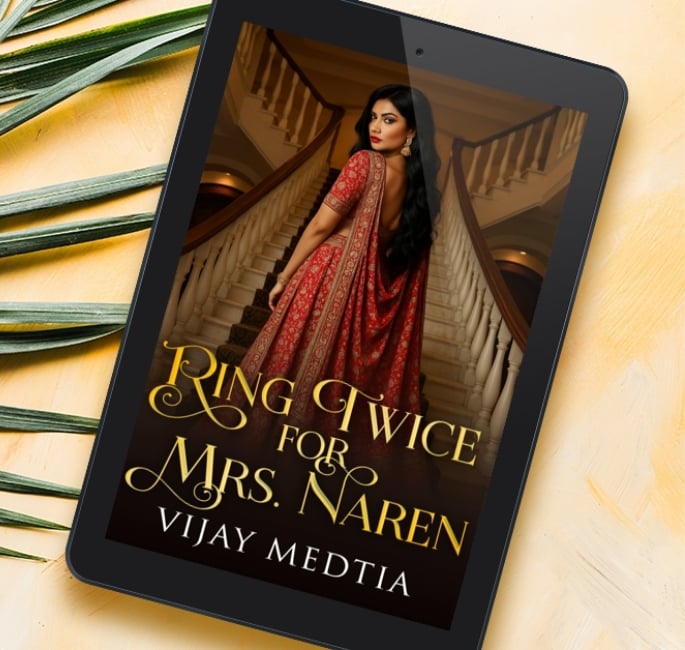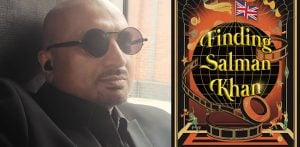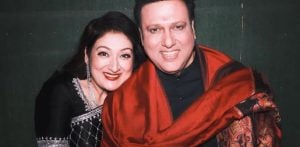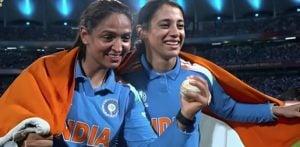"Love has the tremendous power to purify."
Set against the backdrop of 1998 Delhi, Ring Twice for Mrs Naren by Vijay Medtia is a sultry noir tale steeped in desire, secrecy, and danger.
The novel reimagines the classic love-triangle-gone-wrong through a distinctly South Asian lens, tapping into a richly atmospheric world where ambition and morality collide.
Medtia’s story follows Anand Sinha, a struggling lawyer drawn into a web of passion and betrayal by the enigmatic Leela Naren.
The novel explores how far people will go when lust, greed, and guilt take hold, challenging readers to question their moral boundaries.
From dimly lit rooms and landline calls to covert meetings under the veil of cultural conservatism, the Delhi of the late 90s becomes a character in itself, echoing the novel’s tensions between modernity and tradition.
In this exclusive interview with DESIblitz, Vijay Medtia opens up about his inspirations, writing process, and the psychological depth behind his unforgettable characters.
He also shares advice for aspiring writers and hints at what’s next in his literary journey.
Whether you’re drawn to crime fiction or stories that examine the darker sides of human nature, Ring Twice for Mrs Naren promises a riveting read.
What inspired you to write this particular story, and why set it in 1998 Delhi?
 I wanted to write an intense story of crime of passion with high stakes.
I wanted to write an intense story of crime of passion with high stakes.
To explore characters who were prepared to go to extreme lengths.
My last few novels were set in Mumbai, so I wished to change the setting.
Delhi in 1998 offered a certain atmospheric advantage; no smartphones, limited internet, and landline phones that made “ring twice” a covert signal instead of just a quaint detail.
The lack of instant communication helped intensify the suspense and gave space for hidden motives and clandestine meetings, all of which are central to the plot.
Anand Sinha is a complex character. What drew you to centre the story around a morally conflicted protagonist?
Anand Sinha is a struggling lawyer looking for an opportunity to change his life.
A character that readers hopefully could identify with, yet at the same time, I didn’t want him to be all good.
He has flaws, and when he is attracted to the beautiful Mrs Naren, I wanted to write about the dynamics in that relationship.
How far were they both prepared to sacrifice and risk everything to reach their goals?
Whilst writing, of course, both the characters surprised me with their actions. The characters take on their own lives.
Mrs Leela Naren is seductive, intelligent and driven. How did you develop her character, and did you draw on any real-life influences?
 Mrs Naren is an ambitious woman who, at the same time, falls madly in love, and it was good to explore the dynamics of that inner conflict.
Mrs Naren is an ambitious woman who, at the same time, falls madly in love, and it was good to explore the dynamics of that inner conflict.
Love has the tremendous power to purify. Love affects her ambition and greed.
I enjoyed writing the perspective from her character; something different from the usual Indian heroines depicted in movies, and developing a character with a multi-layered personality.
At its heart, the novel explores the ways people compartmentalise their lives. How appearances often mask reality.
Mrs. Naren, as a character, embodies the contradictions of that time: modern yet traditional, liberated yet bound by societal roles and wanting to break free.
The novel weaves a classic love-triangle-gone-wrong with a modern noir feel. Were there any crime writers or stories that influenced your approach?
Yes, the love triangle gone wrong with a modern noir feel in Ring Twice for Mrs. Naren nods to the classic crime-noir canon as well as contemporary reimagining.
Many films and novels have dealt with this theme, but as a writer, you want to write your own version of the classic story.
Every writer hopefully adds a novel twist, bringing a fresh perspective to the story for the readers to enjoy.
Raymond Chandler and Ross Macdonald shaped much of traditional noir through their morally ambiguous characters and terse, seedy atmospheres.
Influences like these often anchor a story in moral dilemmas rather than clear-cut heroism.
While Ring Twice for Mrs. Naren isn’t explicitly modelled after any single Indian noir, there aren’t many novels out there.
The parallels are clear: morally conflicted characters, betrayal through secrecy, and social structures that echo the novel’s psychological backdrop.
Themes of greed, lust, and guilt play heavily in the novel. What did you hope to explore about human nature through the relationships in the story?
 I wanted to explore what lengths the characters were prepared to go to reach their goals.
I wanted to explore what lengths the characters were prepared to go to reach their goals.
Murder is the extreme at the end of the day. It was also an examination of the human condition, lust and greed, followed by guilt.
How would the characters in the novel deal with all three emotions?
It’s not about judgment. It’s about showing the quiet, often hidden unravelling that happens when ambition and passion override conscience.
I’m hoping the readers can relate to the emotions and wonder what they would do in a similar situation.
How important was the setting in shaping the novel’s atmosphere and action?
My last few novels were mainly set in Mumbai, and Delhi offered a fresh background.
I’ve been to Delhi a few times.
Delhi in 1998 was a city at the crossroads: rapidly changing under economic liberalisation, yet still deeply rooted in tradition.
That tension between modernity and conservatism mirrors the dual lives and conflicting desires of the characters.
From the colonial-era homes in Colonel’s Bagh to the congested lanes of Chandni Chowk, from high-rise glimmer in South Delhi to the bureaucratic world of Civil Lines, the varied districts underscore the fractured lives of the characters.
The plot is tightly paced and full of twists. How did you approach writing suspense and maintaining tension throughout the novel?
 Thank you. Writing isn’t easy; it takes many years of practice and discipline, and it’s a craft that needs to be learnt.
Thank you. Writing isn’t easy; it takes many years of practice and discipline, and it’s a craft that needs to be learnt.
You learn from the great writers and the other art forms, especially films.
That is great films, where the directors maintain suspense.
As a writer, you have to learn to edit, cut out unnecessary words and chapters that slow down the novel.
This can be hard sometimes, but you have to be ruthless in editing to keep the plot tight, then hopefully your novel will shine.
How does your background and experience inform your writing, particularly within the crime fiction genre?
I have regularly travelled to India from a young age, and the country has inspired a lot of my writing.
India is unpredictable, full of life and colour. There is a great contrast between wealth and poverty, and the daily struggles inform my writing.
Living in the UK, however, gives you the distance that you need to process and write about life.
Crime fiction allows me the perfect template to write about life in an interesting way.
Though my main aim has always been to entertain the readers.
There are enough professors of life out there preaching away, and I don’t need to add to them.
What advice do you have for those hoping to become published writers?
 Read good writers, and write regularly. There are no shortcuts.
Read good writers, and write regularly. There are no shortcuts.
This requires discipline. Discipline is better than motivation.
Discipline means sitting at your desk every day or at the time you have set aside for writing.
Learn to edit as well. Try to finish the first draft without worrying whether it’s good or bad.
Then you will have a story to work on. Try to enjoy your writing.
Are there plans for a follow-up novel or to explore other genres or stories in the future?
I have another novel that is complete, just editing it now.
It’s a standalone novel like Ring Twice for Mrs Naren.
Hopefully, it will be published next year.
I’m also working on my second Inspector Ajay Shaktawat novel.
The first novel, The Lost Woman of Santacruz, was published in India.
Ring Twice for Mrs Naren is a portrait of obsession, secrecy, and the emotional wreckage left in the wake of human ambition.
Vijay Medtia’s ability to craft layered characters within a tightly wound narrative brings a refreshing voice to Indian noir, a genre still underexplored in South Asian fiction.
His commitment to both story and craft shows in every twist and moral dilemma.
Medtia doesn’t preach, but he invites readers to reflect on love, on power, and on the quiet destruction that desire can cause.
For those seeking a suspenseful, emotionally charged story that lingers long after the final page, Ring Twice for Mrs Naren delivers, and then some.
To find out more about Vijay Medtia and his work, click here.






























































